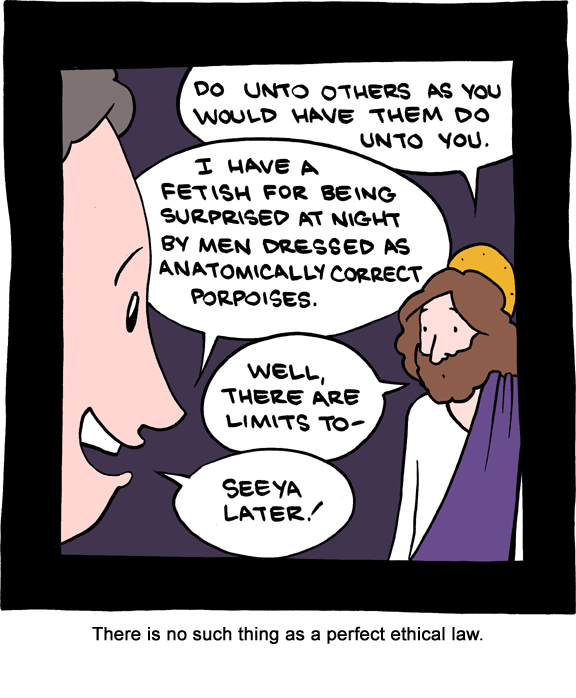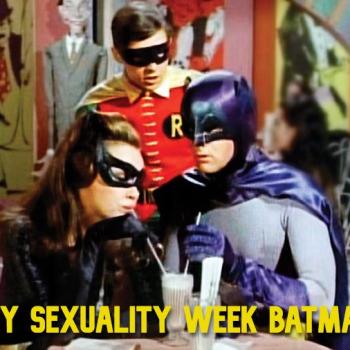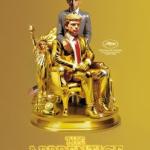James McGrath and Hemant Mehta both point us to this cartoon, from Zach Weiner’s wonderful Saturday Morning Breakfast Cereal.
I’ll bite.
I’m a big fan of SMBC comics, but I think this one gets a bit muddled. I don’t think fellow in this cartoon poses any real problem for the Golden Rule. Yeah, OK, if you insist on a lawyerly reading of one particular formulation of it, then there’s a potential problem here. But that problem comes from a (funny) misreading and misapplication of the rule, not the rule itself.
Jesus in the cartoon — just like the non-cartoon Jesus — says, “Do unto others as you would have them do unto you.”
The fellow responds by saying, “I have a fetish for being surprised at night by men dressed as anatomically correct porpoises.”
The potential problem is that this guy seems to be misunderstanding the law in a clumsily literal, and extremely case-specific way. The joke being that what this guy would like to have others do to him would be to surprise him at night dressed as anatomically correct porpoises, and that he departs thinking that Jesus has just advised or commanded him to go forth and do precisely that to others.
I’m not sure it really tells us anything more about the Golden Rule itself than Woody Allen tells us about Kant’s categorical imperative in his version of much the same joke. Kant’s precept states, “Act only according to that maxim whereby you can, at the same time, will that it should become a universal law.” Woody comically misses the point by applying the rule with the same extreme specificity as in the cartoon: “If everybody went to the same restaurant one evening to eat blintzes, there’d be chaos.”
Neither joke is funny because of any inherent flaw in the ethical principle they’re spoofing. The humor comes, instead, from the intentional, playful obtuseness of their critics. Woody’s joke isn’t funny because it shows that the categorical imperative forbids eating blintzes in restaurants — it’s funny because he thinks that it does.
But as with Woody, we have reason to doubt that Porpoise Guy is really as obtuse as he’s pretending to be. He suggests that he’s misreading Jesus’ statement of the Golden Rule with a distorting specificity, but the cartoon also suggests he knows better.
Look again at the first thing he says, “I have a fetish …” So Porpoise Guy is aware that his thing is not everybody’s thing — that it’s a preference or predilection that sets him apart from others. So he gets it. He understands that some people prefer some things and others prefer other things. And thus he understands that what he enjoys having others do to him is often not the same as what others would enjoy having someone do to them.
So if PG understands that he has “a fetish,” and that he wants others to respect that, then he likely understands Jesus’ words here as an admonition to give others a reciprocal respect for their fetishes (or lack thereof).
Let’s consider the same basic confusion of misplaced specificity, but let’s do so by applying the Golden Rule to a similar, but less distractingly porpoise-sex-laden example.
I drink coffee black. That’s my preference — that’s how I, personally, prefer to drink coffee. Yet when I make coffee for guests, I always ask if they would like cream or sugar (or tea, perhaps, or something cold, or … let’s just keep this simple and stick to coffee).
Is this conventional hospitable courtesy an expression of the Golden Rule? Or is it a violation of that rule?
The only way to argue that it is a violation of the Golden Rule would be to interpret that rule with the same misplaced specificity we see in Woody’s and Weiner’s jokes. From an overly specific, overly literal perspective, you could argue that serving someone coffee with cream and sugar would be doing unto others other than I would have them do unto me.
That’s obviously silly — which is why it works as the basis for jokes, but not as the basis for a critique of the actual idea of the Golden Rule.
Take away that misplaced specificity and it’s equally obvious that, yes, the courtesy of offering my guests cream and sugar can be seen as a mild expression of the Golden Rule. I would prefer that others allow me to enjoy coffee the way I like it. And thus it’s right for me to allow others to enjoy coffee the way they like it.
The Golden Rule is a broad principle that asks to be interpreted and applied broadly. Applying it with a narrow, extremely specific legalism misses the point and winds up violating the rule itself. Deliberately missing the point for comic effect is funny, but only insofar as the point-missing is the butt of the joke and we don’t imagine we’ve thereby proven anything substantial about the point itself — other than that we humans have an amusing knack for missing it.
That’s why I’m not sure what to make of Weiner’s caption for his cartoon: “There is no such thing as a perfect ethical law.” If the point there is that imperfect people will always botch even the most perfect-seeming principles, then I fully agree. But if the point is that the exchange in the cartoon above exposes some imperfection in the Golden Rule, then I’m afraid he’s lost me there.
(That’s not to say that I think the Golden Rule is a “perfect ethical law” — one easily and neatly applicable to any and all situations. It’s pretty terrific for one-on-one situations, but it becomes less immediately helpful when we introduce third or fourth parties into the mix.)
I’m also puzzled by Jesus’ response to PG’s first statement. “Well, there are limits to –” Jesus says, and I’m not sure what the rest of that sentence was going to be had he not been interrupted. PG’s problem isn’t that he’s crossed some “limit” or boundary. His problem is that he’s hinted at an overly specific interpretation of Jesus’ rule that might cause him to miss the point.
Jesus’ mention of “limits” in that third line muddles the joke, suggesting that the intrinsic morality or immorality of PG’s particular fantasy is somehow relevant to his confusion about of the Golden Rule. It’s not. The comic factor here is not that what PG would have others do unto him is somehow intrinsically wrong, but rather that what he specifically would have others do unto him is most likely not something that others would want to have done unto them.
But while it clouds the joke and blurs the punchline, this tangential invitation to consider the morality of PG’s fetish also adds another touch of comic discomfort. So let’s go with that. Is PG’s unusual preference somehow inherently wrong? Or is it — like my own preference for no sugar, no cream, thank you — simply a matter of personal taste that’s not otherwise morally meaningful?
Once we get past the initial extravagance of PG’s preference, I think it’s more the latter. His particular taste is elaborately detailed, it introduces some logistical hurdles and potentially entails a large costume expense (which, like all large expenses, might be morally consequential), but unless I’m missing something, it doesn’t seem harmful, malicious, cruel, exploitative or otherwise inherently wicked.
The ethics in play in this cartoon are those of the Golden Rule, and it doesn’t seem that PG’s fantasy violates that principle. Where’s the harm in it? We haven’t seen that it’s some kind of oppressive compulsion interfering with his own happiness. Nor does it seem to be something he’s compelling others to participate in against their will. I’m sure that somewhere, some group of righteous folk has a behavior code that regards aquatic mammal costumes as an abomination, but that’s not a rule Jesus ever discussed.
(Suddenly I realize what I’ve just done. It’s only been a couple of days since this post about Bryan Fischer prompted an odd, but robust discussion in comments, and I’ve just potentially reintroduced the same subject here. I apologize.)
Anyway, apart from the porpoise costumes, the point is this: Do unto others as you would have them do unto you. And that means asking them how they like their coffee.
















